|
|
|
Sort Order |
|
|
|
Items / Page
|
|
|
|
|
|
|
| Srl | Item |
| 1 |
ID:
173790
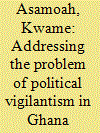

|
|
|
|
|
| Summary/Abstract |
Ghana entered into the Fourth Republic in 1993 after experiencing political instability over two decades. A defining feature that has characterized the Fourth Republic of Ghana and marred Ghana’s democratic credentials is the emergence of political vigilantism. Political vigilantism has basically been perpetuated by the two leading political parties in Ghana: the New Patriotic Party and National Democratic Congress. The major political actors in the political system of Ghana continue to express the debilitating effects of political vigilantism on Ghana’s democratic advancement, nevertheless, it continues to persist in monumental proportion in our political dispensation. Using a qualitative research approach, the paper examines the factors responsible for the pervasiveness of political vigilantism under the Fourth Republic of Ghana and proffer some plausible solutions to address this political canker.
|
|
|
|
|
|
|
|
|
|
|
|
|
|
|
|
| 2 |
ID:
189852
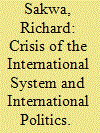

|
|
|
|
|
| Summary/Abstract |
Despite the Cold War and numerous hot wars, there is an essential continuity
in the post-war period based on the Charter International System created
in 1945. The United Nations and the associated declarations, organizations
and normative orientations remain the framework for the conduct of
international relations. At the level of international politics, orders are
created in which states contend and hegemonic formations take shape.
The Soviet-led bloc disintegrated in 1989-1991, leaving the field clear
for the U.S.-led political West to claim universality, and on that basis
seek to expand globally. However, the distinction between the system
and conjunctural political sub-order is crucial to explain the dynamics in
international affairs today.
|
|
|
|
|
|
|
|
|
|
|
|
|
|
|
|
| 3 |
ID:
092611
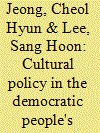

|
|
|
|
|
| Publication |
2009.
|
| Summary/Abstract |
The purpose of this paper is to introduce North Korean culture as well as its foundation, North Korean cultural policy. The paper consists of three broad sections. First, I explore the unique qualities and changes of North Korean cultural policy. Next, I look into what North Korea considers to be culture and how it is portrayed. Finally, I will analyze the similarities and differences between North and South Korean cultural policy, and the possibility of their convergence.
|
|
|
|
|
|
|
|
|
|
|
|
|
|
|
|
| 4 |
ID:
140294
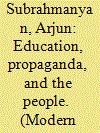

|
|
|
|
|
| Summary/Abstract |
On the morning of 24 June 1932 the ‘People's Party’, a small group of civil and military bureaucrats, toppled the Thai absolute monarchy and introduced constitutional democracy. This article discusses the establishment of democracy as an endeavour in ‘democratic paternalism,’ by which is meant the Party's attempt to establish a new moral and intellectual leadership that had as its main goal the creation of a depoliticized democratic citizenry. To implement their programme for democracy, the Party embarked on an ambitious plan to modernize education and explain popular sovereignty through countrywide lectures and radio programmes. The democratic paternalist effort had mixed results. State weakness limited the reach of the educational and propaganda campaigns, and further the ‘people’ in whose name the revolution was staged, constituted two different groups: a largely illiterate peasantry and a small, incipient new intelligentsia. Because of its limited capacity, the People's Party tasked the second group with assisting in democratic mentorship of the masses, but many in this second category of people had a broader conception of democracy than the Party's ‘top-down’ model and criticized the Party for its paternalist constraints on popular sovereignty. Democratic paternalism and frustration with the limits imposed on popular democracy are two central aspects of this period of history that have endured in Thai society.
|
|
|
|
|
|
|
|
|
|
|
|
|
|
|
|
| 5 |
ID:
084253
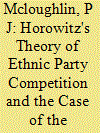

|
|
|
|
|
| Publication |
2008.
|
| Summary/Abstract |
Donald Horowitz's theory of ethnic conflict suggests that a political party operating in a deeply divided society can be effected by a centrifugal pull even when it is not subject to formal electoral competition. This idea can be applied to Northern Ireland's SDLP in the 1970s, when the party faced no credible electoral rival within its primary political constituency. Doing so helps to explain why the SDLP failed in its original objective of mobilizing a cross-community constituency, and instead became what Horowitz terms an "ethnically based party," representing the interests of only one side of the political divide in Northern Ireland.
|
|
|
|
|
|
|
|
|
|
|
|
|
|
|
|
| 6 |
ID:
092554
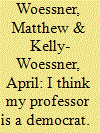

|
|
|
|
|
| Publication |
2009.
|
| Summary/Abstract |
Notwithstanding political science professors' concerted efforts to remain politically neutral in the classroom, we find evidence that students are able to successfully identify the partisan loyalties of their professors. Furthermore, we find that there is a tendency for students to drift toward the Democratic Party over the course of the semester, yet the direction of the shift appears to be unrelated to either the instructor's actual political loyalties, or to the student's perception of the professor's partisan preferences. Given that political science professors appear to exert no real influence on students' party loyalties, it is unclear whether efforts to diversify the field by hiring more Republican professors would actually reduce the "liberalizing" effects of higher education.
|
|
|
|
|
|
|
|
|
|
|
|
|
|
|
|
| 7 |
ID:
086989
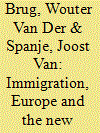

|
|
|
|
|
| Publication |
2009.
|
| Summary/Abstract |
Kriesi et al. announced the birth of a new cleavage in contemporary Western Europe, one dividing the winners and losers of globalisation. Their studies in 2006 and 2008 contain analyses of party positions in six countries, based on the contents of editorial sections of newspapers. This article challenges the main conclusion of Kriesi et al. by demonstrating ? on the basis of two expert surveys ? that party positions are mainly structured by one dimension. The structure detected by Kriesi et al. in their analysis of parties is not found, except concerning voter positions. A consequence of this article's findings is that large groups of citizens are not represented by any parties, in particular those who are left-wing on socio-economic issues and right-wing on cultural issues. The article in its conclusion discusses possible causes for the differences between these findings and those of Kriesi et al., and the implications of these findings for democratic representation.
|
|
|
|
|
|
|
|
|
|
|
|
|
|
|
|
| 8 |
ID:
091489
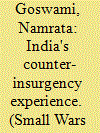

|
|
|
|
|
| Publication |
2009.
|
| Summary/Abstract |
The Indian Army, a force trained primarily for conventional warfare, has been engaged in internal counter-insurgency operations since the 1950s. Despite such a long innings on a counter-insurgency mode, little attention has been accorded within military circles to doctrinal innovation for waging sub-conventional warfare in India's democratic political context. At best, the Army continues to view counter-insurgency duty as secondary to its primary duty of defending India from external conventional threats. By conceptualizing a counter-insurgency strategy of 'trust and nurture', this article aims to fill this critical doctrinal gap in India's military policy. The author argues that a counter-insurgency strategy of 'trust and nurture' based on democratic political culture, measured military methods, special counter-insurgency forces, local social and cultural awareness and an integrative nation-building approach will result in positive handling of India's internal security problems. The author utilizes India's counter-insurgency experiences in Assam, Mizoram, Nagaland, Punjab, and Operation 'Sadhbhavana' in Jammu and Kashmir as illustrative empirical indicants in order to validate the 'trust and nurture' strategy.
|
|
|
|
|
|
|
|
|
|
|
|
|
|
|
|
| 9 |
ID:
086221
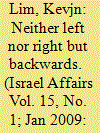

|
|
|
|
|
| Publication |
2009.
|
| Summary/Abstract |
Students of Israeli politics will observe that, against the backrop of perpetual siege, the complexity and intensity of fault lines undercutting the nation of six million have become axiomatic- Jew/Arab, Ashkenazi/Sephardi-Mizrahi,religious/secular, left/right, hawk/dove, veteran/immigrant, Zionist/post-Zionist, etc. Yet, Israel has maintained a remarkable degree of stability.
|
|
|
|
|
|
|
|
|
|
|
|
|
|
|
|
| 10 |
ID:
138759
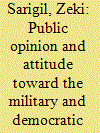

|
|
|
|
|
| Summary/Abstract |
The political influence of the Turkish military has substantially declined in the last decade, triggered by the European Union’s decision during the Helsinki Summit in 1999 to grant candidacy status to Turkey. This study illuminates Turkey’s democratization process in the post-Helsinki period by empirically analyzing a relatively underinvestigated aspect of civil–military relations: public opinion and attitude toward the military and civil–military issues. Empirical analyses, based on original and comprehensive public opinion data, indicate that despite impressive reforms and improvements in the legal and institutional structures in Turkish civil–military relations in the past ten years, democratic transformation in the political culture has been lagging behind. This gap is likely to complicate democratization process in Turkey. The article also provides a discussion of broader theoretical and practical implications of empirical findings.
|
|
|
|
|
|
|
|
|
|
|
|
|
|
|
|
| 11 |
ID:
086336
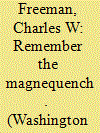

|
|
|
|
|
| Publication |
2009.
|
| Summary/Abstract |
In spring 2008, Senator Hillary Rodham Clinton mounted a quixotic but remarkable comeback in her battle for the Democratic presidential nomination against Senator Barack Obama. Although it ultimately fell just short, part of the success of her resurgent campaign was a tilt in her message from policy to populism. Tapping into the hopes and insecurities of the U.S. public, she repositioned herself as champion of the "forgotten" middle class, focusing her message on pocketbook issues, jobs, and popular anxieties about globalization.
|
|
|
|
|
|
|
|
|
|
|
|
|
|
|
|
| 12 |
ID:
172037
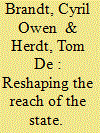

|
|
|
|
|
| Summary/Abstract |
We analyse the politics of the reform of teacher payment modalities in the Democratic Republic of Congo (DRC) in light of the uneven territorial reach of the DRC state. The reform focused on extending this reach by paying all teachers via a bank account, replacing long-standing shared governance arrangements between state and faith-based organisations with a public-private partnership. By using qualitative and quantitative data, we map the political practices accompanying the implementation of the reform. While the reform itself was officially deemed a success, its intended effects were almost completely offset in rural areas. Moreover, governance of teacher payments was not rationalised but instead became even more complex and spatially differentiated. In sum, the reform has rendered governance processes more opaque and deepened the existing unevenness in the geography of statehood.
|
|
|
|
|
|
|
|
|
|
|
|
|
|
|
|
| 13 |
ID:
084413
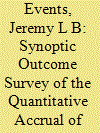

|
|
|
| 14 |
ID:
090708
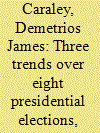

|
|
|
|
|
| Publication |
2009.
|
| Summary/Abstract |
Demetrios James Caraley analyzes three key trends over the last eight presidential elections: the ending of party dealignment but without the emergence of a new majority party coalition, the geographic realignments making the South solid Republican and the Northeast and Pacific coast solid Democratic, and the volatility that has taken place among various politically relevant social and demographic groups. He also discusses whether the election of Barack Obama as president with the simultaneous election of solid Democratic majorities in the House and Senate signal a coming of a new majority Democratic realignment.
|
|
|
|
|
|
|
|
|
|
|
|
|
|
|
|
| 15 |
ID:
112077
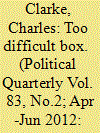

|
|
|
|
|
| Publication |
2012.
|
| Summary/Abstract |
Within our democratic political system too many of the pressing and serious political, economic and social challenges of our times are delayed or put off, deposited in the 'Too Difficult Box'. This happens for a variety of reasons which include failure correctly to identify the best solution, failure to understand obstructions in implementing the proposed solution, difficulties in placating or overcoming a range of vested interests, glitches in circumnavigating a range of legal constraints, lack of appreciation of the international dimension of the issue, succumbing to the vicissitudes of the political process and evaporation of the necessary political creativity and energy. It is a responsibility of democratic politics to find ways of dealing with these problems, through more collaborative or consensual politics if necessary. Otherwise citizens will lose confidence in the ability of democracy to solve the problems which concern them.
|
|
|
|
|
|
|
|
|
|
|
|
|
|
|
|
| 16 |
ID:
086985
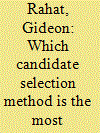

|
|
|
|
|
| Publication |
2009.
|
| Summary/Abstract |
Scholars of political institutions debate the level to which defferent institutions help or hinder the realization of various democratic principles, but in the case of candidate selection methods there is no such discourse.
|
|
|
|
|
|
|
|
|
|
|
|
|
|
|
|
|
|
|
|
|